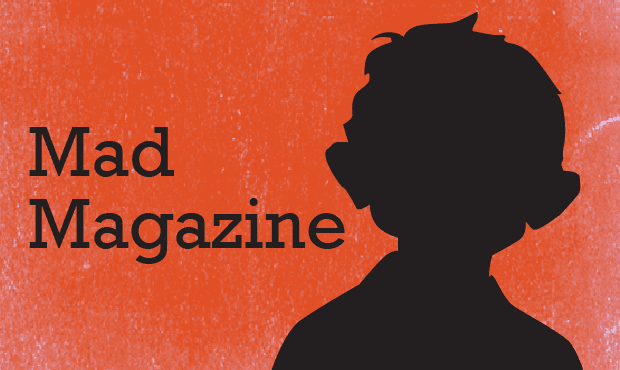American Icons: “Mad Magazine”
This is the magazine that made America snarky.
In 1954, a US Senate subcommittee investigating juvenile delinquency called William Gaines, publisher of the successful EC Comics, to testify. “You think it does the children a lot of good to read these things?” asked the subcommittee’s counsel. “I don’t think it does them a bit of good, sir, but I don’t think it does them a bit of harm, either,” Gaines said.
Before Congress could take action, comics publishers decided to regulate themselves. They adopted the Code of the Comics Association, which sharply limited violence, kissing, and other fun stuff in comics. To get around these strictures, Gaines turnedMad Comics— which parodied other comic books — intoMad Magazine. Harvey Kurtzman, the editor, “starts mining all of American culture,” says Maria Reidelbach, the author ofCompletely Mad: A History of the Comic Book and Magazine. Movies, television, books, even Broadway shows that kids probably hadn’t seen, all became fair game toMadwriters.
That juvenile, subversive undercutting of the adult world was tremendously influential for the kids who became the counterculture. In his bookThe Sixties: Years of Hope, Days of Rage, sociologist Todd Gitlin wrote, “Madpulled the plug and said, ‘The Lone Ranger, Wonder Bread, and TV commercials — even Marlon Brando — are ridiculous!'”
Yet in mocking so much of the adult world,Madwas also slyly educational. Longtime writer Arnie Kogen says, “I never aimed anything at kids. I just wrote what I thought was funny. If kids got it, they got it. If they didn’t get it, that was their problem.” On one page,Madwould parody TV shows, and would be talking about Soviet politics on the next. In 1963, they ran a parody of West Side Story’s “Jet Song” called “When You’re a Red.”
When you’re a Red,
You’re a Red all the way
From your first party purge
To your last power play
Roger Ebert creditedMad‘s movie parodies with teaching him to watch with a critical eye. “Mad‘s parodies made me aware of the machine inside the skin — of the way a movie might look original on the outside, while inside it was just recycling the same old dumb formulas,” Ebert wrote in hisforwardtoMad About the Movies.
By this point, several generations of comedy writers have been reared onMad Magazine, and its influence extends to shows likeSouth Park,The Daily Show, andThe Simpsons, which has explicitly paid tribute toMad. Even Matthew Weiner, the creator ofMad Men, has citedMadas an inspiration. The magazine’s parody of Madison Avenue gave Weiner his first look at a “drunken, callow, glib, self-serving ad man,” as he wrote in the bookInside Mad.
TheMadsensibility shaped today’s culture of clever, snide sarcasm — the ubiquitous style we call snark. Todd Gitlin says, “Madwon.Madis now the dominant culture. Today, being unserious is the premium posture.” But even a comedy writer (and son of aMadpioneer) like Jay Kogen sees a downside toMad‘s victory. “It supports the idea that it’s better to be cynical than to really feel something,” Kogen reflects. “I’ve been much more ready to pick something apart and to make fun of it rather than to just enjoy it.”
“I don’t think that until I had a child was I able to appreciate that there is such a thing as innocent joy,” Kogen adds. “There’s something to be said for sincerity.”
(Originally aired July 25, 2014)
